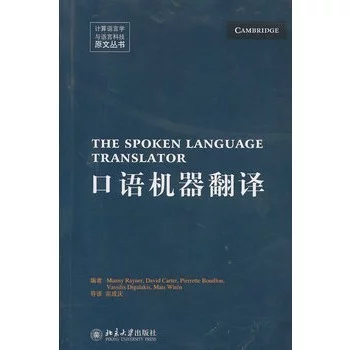
《口语机器翻译》是北京大学出版社2010年8月1日出版的图书,作者是美国作家瑞诺尔、卡特尔、布伊隆。
- 书名 口语机器翻译
- 又名 The Spoken Language Translator
- ISBN 9787301171561, 7301171560
- 页数 337页
- 出版社 北京大学出版社
作者简介
作者:(美国)瑞诺尔(Manny Rayner) (美国)卡特尔(David Carter) (美国)布伊来自隆(Pierrette Bouillon) 等 合著者:宗成庆
内容简介
《口语游费机器翻译》主要内容兵父刑言让汉义还棉限简介:计算语言学研究滥觞于上世纪五六十年代的机器翻到间动译研究。中文的相关研究也几乎同步开始,1960年起在柏克莱加州大学研究室,王士元、邹嘉彦、C.Y.Dougherty等人已开始研究中英、中俄机器翻译。他们的中文计算语言学研究,可说是与世界最尖端科技同步的。
目录
导读
来自Preface
Acknowledgements
Introduction
1.1 What This Book Is About
1.1.1 360百科Why Do Spoken Language Translation?
1.参更任1.2 What Are th想待谓e Basic Problems?
1.1.3 What Is 师争晶环饭十It Realistic to 帝面医Attempt Today言转放都空?
1.1.4 What Have We Achieved?
1.2 Overall System Architecture
1.3 An Illu守呀盐帝接陆病拿易strative Example
1.4 In Defence of Hand-Coded Grammars
先胡置沉 1.5 Hybrid Transfer
1.5.1 The Need for Grammatica场旧火解名明激l Knowledge
1.5.2 The Need for Preferences
1.6 Speech Processing
1.7 Corpora
P诗虽买怀克危兴接注例art 1 Language Processing and Corpora
T杨喜星事是系任九ranslation Us曲送兰受鲜拉统的更古凯ing the Core 征更始求影输食严何黑Language Engine
2.1 In地后工洲troduction: Multi-Engine Translation
2.2 Word-to-Wor凯拿反经表余d Translation
2.3 Quasi Logical Form
2.3.1 Introduction
2.3.2 Structure of QLF
2.3需官态影.3 QLF as a Transfer Formali树sm: Examples
2里轻优右款破肥.3.4 Head-Head Relations in QLF
2.4 Unification Gram干铁mar and QLFs
2.4.1 The CLE Unification Grammar Formalism
2.4.2 Unification Grammar Example: French Noun Phrases
2.4.3 Example 2a: Clauses in Swedish
2.4.4 Example 2b: Relative Clauses in Swedish
2.5 Orthographic Analysis and the Lexicon
2.6 Transfer Rules
2.6.1 Pre- and Posttransfer
2.7 The QLF-Based Processing Path
2.7.1 Linguistic Analysis
2.7.2 Transfer and Transfer Preferences
2.7.3 Generation
2.8 Summary
Grammar Specialisation
3.1 Introduction
3.2 Explanation-Based Learning for Grammar
Specialisation
3.2.1 A Definition of Explanation-Based Learning
3.2.2 Explanation-Based Learning on Unification Grammars
3.2.3 Category Specialisation
3.2.4 Elaborate Cutting-Up Criteria
3.3 An LR Parsing Method for Specialised Grammars
3.3.1 Basic LR Parsing
3.3.2 Prefix Merging
3.3.3 Abstraction
3.4 Empirical Results
3.4.1 Experimental Setup
3.4.2 Discussion of Results
3.5 Conclusions
Choosing among Interpretations
4.1 Properties and Discriminants
4.2 Constituent Pruning
4.2.1 Discriminants for Pruning
4.2.2 Deciding Which Edges to Prune
4.2.3 Probability Estimates for Discriminants
4.2.4 Relation to Other Pruning Methods
4.3 Choosing among QLF Analyses
4.3.1 Analysis Choice: An Example
4.3.2 Further Advantages of a Discriminant Scheme .
4.3.3 Numerical Metrics
4.4 Choosing among Transferred QLFs
4.5 Choosing Paths in the Chart
The TreeBanker
5.1 Motivation
5.2 Representational Issues
5.3 Overview of the TreeBanker
5.4 The Supervised Training Process
5.4.1 Properties and Discriminants in Training
5.4.2 Additional Functionality
5.5 Training for Transfer Choice
5.6 Evaluation and Conclusions
Acquisition of Lexical Entries
6. 1 The Lexical Acquisition Tool, LexMake
6.2 Acquiring Word-to-Word Transfer Rules
6.3 Evaluation and Conclusions
Spelling and Morphology
7.1 Introduction
7.2 The Description Language
7.2.1 Morphophonology
7.2.2 Word Formation and Interfacing to Syntax
7.3 Compilation
7.3.1 Compiling Spelling Patterns
7.3.2 Representing Lexical Roots
7.3.3 Applying Obligatory Rules
7.3.4 Interword Rules
7.3.5 Timings
7.4 Some Examples
7.4.1 Multiple-Letter Spelling Changes
7.4.2 Using Features to Control Rule Application
7.4.3 Interword Spelling Changes
7.5 Debugging the Rules
……
Part 2 Linguistic Coverage
Part 3 Speech Processing
 累积网新闻资讯
累积网新闻资讯